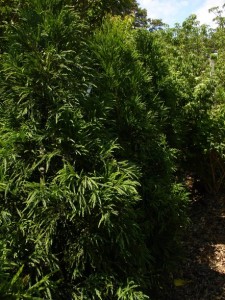
“Screening” is the term used by landscapers for plant material that hides an unwanted view. We get questions weekly at the Nursery about the best type of plants to use for this purpose. It’s one of those problems that doesn’t have a perfect solution on Nantucket. However there are several trees and shrubs that will provide a year-round living wall that won’t be decimated by deer.
Medium to short hedges can be created with boxwood. Buxus in all its forms is an extremely deer resistant, evergreen plant for us on Nantucket. Boxwood lends itself perfectly to shearing into hedges, but also looks great allowed to grow naturally. Many people are surprised to learn that American boxwood, Buxus sempervirens, will grow slowly to upwards of 15 feet, making a very dense screen.
In situations where a tall hedge is needed quickly, trees are a better option. The most deer resistant of these are Thuja plicata cultivars like ‘Green Giant’ aka ‘Spring Grove’, Ilex opaca (American Holly), Cryptomeria japonica (Japanese Cedar) and trees in the genus Picea (Spruce) and Pinus (Pines).
Because evergreens hold their foliage all winter, they are more susceptible to desiccation than deciduous trees. Keep these points in mind to help your plants make it through the winter with the least amount of damage.
- Be sure that plants are well hydrated going into winter dormancy.
- If you live in an area with punishing winds, spray with an anti-desiccant, like WiltPruf in December, and several times during winter warm-ups to stop the foliage drying out when the plant can’t pull in moisture from frozen soil.
- If you decide to spray anti-desiccants, be sure to research individual plants first. These products can damage several evergreens, especially some types of Thuja and those trees with glaucous needles.
- If your property is close to the shore or on a hill, consider covering the plants with burlap from mid December through February, when damage is most likely to occur.
